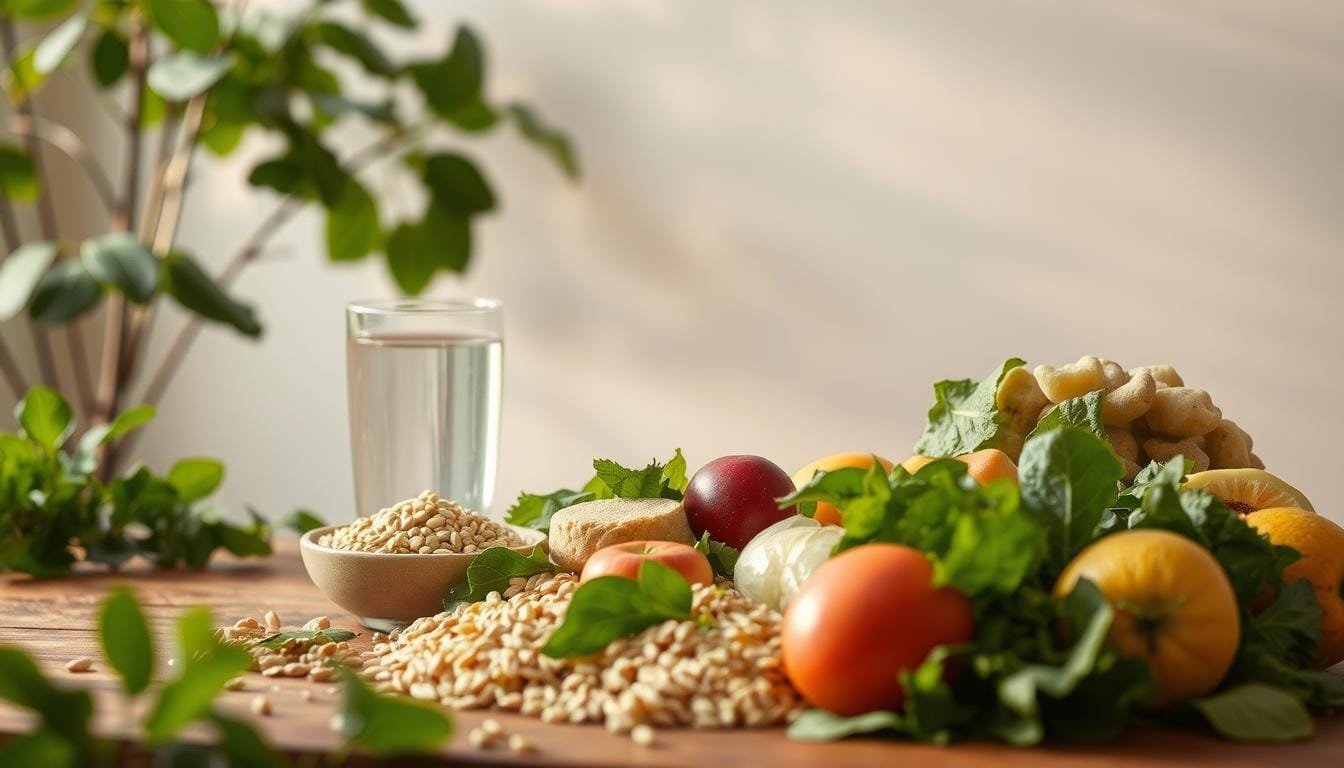Currently Empty: RM0.00
Did you know that what you eat may influence how you handle daily pressures? Modern lifestyles often leave little room for balanced meals, leading to imbalances in the digestive system. Research shows that over 90% of people don’t get enough key nutrients, which play a vital role in maintaining overall health.
Wellness Concept specializes in science-backed strategies to support gut wellness. Busy schedules and high stress can disrupt natural body functions, but small dietary adjustments make a big difference. Studies highlight how certain foods help regulate mood and physical well-being.
This article explores practical solutions tailored for Malaysians. Learn how simple changes can enhance resilience against daily stressors while promoting long-term vitality.
Key Takeaways
- Over 90% of individuals fall short of essential nutrient intake.
- Diet directly affects stress management and gut balance.
- Wellness Concept offers expert-guided digestive wellness plans.
- Modern lifestyles often neglect critical dietary needs.
- Small dietary tweaks can improve both physical and mental health.
Contact Wellness Concept via WhatsApp (+60123822655) during business hours for personalized advice.
Understanding Stress-Related Digestion Issues
Stress doesn’t just affect your mind—it can wreak havoc on your gut too. When tension builds, the digestive tract often bears the brunt, leading to discomfort and dysfunction. Research shows chronic stress disrupts the gut-brain axis, a communication network linking emotions and digestion.
Conditions like irritable bowel syndrome (IBS) and functional dyspepsia frequently flare up under pressure. These disorders cause:
- Bloating and gas
- Irregular bowel movements (constipation or diarrhea)
- Abdominal pain or cramping
In the U.S., 51 million ER visits yearly stem from digestive problems. While Malaysia-specific data is limited, global trends suggest similar risk patterns. Busy urban lifestyles and high stress levels likely contribute.
Diet plays a pivotal role in managing these symptoms. Simple adjustments, like incorporating more whole foods, can restore balance. The next sections explore practical steps to support gut health naturally.
How Fiber Helps with Stress-Related Digestion
Your gut and brain share a powerful connection that impacts overall wellness. When stress strikes, this bond can either soothe or strain your system. The right nutrients, like dietary fiber, play a starring role in keeping both in harmony.
Soluble vs. Insoluble Fiber: What’s the Difference?
Not all fibers work the same way. Soluble fiber dissolves in water, forming a gel that slows digestion. This helps regulate blood sugar spikes—a common stress response. Oats and beans are great examples.
Insoluble fiber, found in whole grains, adds bulk to stool. It prevents stress-induced constipation by speeding up bowel movements. Both types are essential for a balanced diet.
| Type | Function | Food Sources |
|---|---|---|
| Soluble Fiber | Slows digestion, stabilizes blood sugar | Oats, apples, lentils |
| Insoluble Fiber | Adds bulk, prevents constipation | Brown rice, nuts, spinach |
The Gut-Brain Connection: How Fiber Supports Mental Health
Gut bacteria thrive on fiber, producing 90% of the body’s serotonin—a mood-regulating chemical. This makes fiber a natural stress buffer. Local foods like oat porridge or ulam (Malaysian herbs) are easy ways to feed these good bacteria.
Studies show that fiber-rich diets reduce inflammation, another stress trigger. By nourishing gut bacteria, you’re not just aiding digestion—you’re boosting mental resilience too.
Types of Dietary Fiber and Their Benefits
Local Malaysian staples offer hidden benefits for both body and mind. Two main types of dietary fiber—soluble and insoluble—work together to support gut health, especially during stressful periods. Each type thrives in different plant foods, many of which are already kitchen staples.
Soluble Fiber: Oats, Beans, and Fruits
This type dissolves in water, forming a gel that slows digestion. Oats contain beta-glucans, shown to reduce LDL cholesterol by 5–10%. Popular Malaysian sources include:
- Pisang raja: A fiber-rich banana variety
- Kacang kuda (chickpeas): Packed with resistant starch
- Apples (with skin): Ideal for quick snacks
Minimal peeling preserves nutrients. For instance, cooled rice develops resistant starch, improving insulin sensitivity.
Insoluble Fiber: Whole Grains, Nuts, and Vegetables
These grains add bulk to stool, preventing stress-related constipation. Local favorites like brown rice and kangkung (water spinach) are excellent choices. Flaxseeds, though small, deliver both fiber types.
Traditional diets often outperform modern ones in fiber content. Simple swaps—like choosing whole-grain foods over refined versions—can make a big difference. For more ideas, explore the health benefits of fiber.
The Science Behind Fiber and Digestive Health
Modern studies uncover surprising connections between diet and disease prevention. A 2023 research paper found a 14% lower colorectal cancer risk among those with adequate intake. Every 7g daily serving also reduces heart disease chances by 9%.

Clinical trials show remarkable IBS symptom improvement. Fermentable fibers boost beneficial Bifidobacteria by 40%, easing discomfort. However, FODMAPs—certain fermentable carbs—may worsen stress-related IBS in sensitive individuals.
Stress can weaken intestinal barriers, but soluble fibers help. They form protective gels that prevent “leaky gut.” Asian microbiome studies reveal unique gut flora patterns, suggesting localized dietary approaches work best.
| Fiber Type | Health Benefit | Malaysian Adaptation |
|---|---|---|
| Fermentable | Strengthens gut lining | Replace wheat with cooled rice (higher resistant starch) |
| Non-fermentable | Prevents constipation | Choose whole-grain nasi lemak over white rice |
Many Malaysians believe “cooling” foods like cucumbers reduce inflammation. While hydrating, they lack the fermentable fibers needed for true gut health. Balanced meals with diverse plants offer better protection against disease.
Emerging research confirms these nutrients do more than aid digestion. They actively combat stress-induced damage throughout the body. Simple choices like oats for breakfast or chickpeas in curries make measurable differences.
How to Incorporate Fiber into Your Diet
Small changes in daily eating habits can transform gut health and energy levels. A balanced diet rich in whole foods supports digestion and combats stress. Start with simple swaps—like choosing brown rice over white—to boost nutrient intake effortlessly.
Fiber-Rich Breakfast Ideas
Kickstart your day with chia seed pudding (10g fiber per ounce) or oats topped with local fruits like pisang raja. For a savory twist, try whole-grain roti canai with lentil curry. These meals stabilize blood sugar and keep you full longer.
Snacks and Meals for Better Digestion
Upgrade snacks with roasted chickpeas or flaxseed-spiked teh tarik. For lunches, add bran to nasi lemak or toss kangkung into stir-fries. Budget-friendly tips:
- Soak legumes overnight to cut cooking time by 30%.
- Swap imported quinoa with local beras perang (brown rice).
Hydration is key—aim for 35ml of water per kg of body weight daily. Pair high-fiber foods with fluids to prevent bloating. A 7-day meal plan with 30g fiber/day simplifies daily life without drastic changes.
Common Mistakes When Increasing Fiber Intake
Many people unknowingly sabotage their gut health by making common fiber mistakes. Rushing the process often leads to bloating, gas, or cramps—symptoms reported by 60% who boost intake too fast. For Malaysians, cultural dietary habits add unique challenges.

Top Malaysian Pitfalls
Locals often rely on supplements instead of whole foods, missing out on synergistic nutrients. Improper soaking of beans or grains leaves phytates intact, reducing mineral absorption by 15–20%. Other errors include:
- Ignoring water intake, worsening constipation.
- Pairing high-fiber meals with dehydrating teh tarik.
- Eating fiber too close to stressful work periods.
Smart Strategies
A gradual increase of 5g every three days lets the gut adapt. For those on thyroid or antidepressant meds, spacing fiber and medication by 2–4 hours reduces risk of interference. Combat flatulence with peppermint tea or ginger.
| Mistake | Solution | Timing Tip |
|---|---|---|
| Sudden fiber spikes | Add oats or lentils slowly | Morning meals for better tolerance |
| Dry preparations | Soak legumes overnight | Pre-dinner snacks avoid work disruptions |
Aligning fiber-rich meals with low-stress time slots—like weekends—minimizes discomfort. Small tweaks ensure smoother transitions to a gut-friendly lifestyle.
When to Seek Professional Help
Persistent gut issues may signal deeper health concerns needing expert attention. While diet tweaks often help, certain red-flag symptoms demand medical evaluation. Ignoring them increases the risk of complications.
- Unexplained weight loss (5+ kg in 3 months)
- Nocturnal diarrhea disrupting sleep
- Blood in stool or black, tarry stools
- Severe abdominal pain lasting over 48 hours
- Family history of colorectal disease
- Iron deficiency anemia without obvious cause
- Difficulty swallowing or persistent vomiting
Wellness Concept uses advanced diagnostics like gut microbiome testing to pinpoint imbalances. Their 3-step approach:
- Comprehensive stool analysis to identify pathogens.
- Personalized nutrition plans targeting specific deficiencies.
- Follow-up protocols to monitor progress.
For severe cases, treatments may include probiotics, medications, or referrals to specialists. Preparing for your visit? Track meals and symptoms for 7 days using their free food diary template.
“After years of bloating, microbiome testing revealed bacterial overgrowth. Within 8 weeks on a tailored plan, my energy and quality of life improved dramatically.” — Kuala Lumpur patient (anonymous)
Early intervention prevents minor issues from becoming chronic. If in doubt, consult a gastroenterologist—especially when home remedies fail.
Conclusion
Taking control of gut wellness starts with simple, actionable steps. Gradually increase fiber intake, pair it with hydration, and choose whole foods over processed options. These changes support both physical and mental health.
Wellness Concept offers personalized consultations to tailor these strategies. Their experts analyze individual needs and create balanced plans for long-term results. Reach out via WhatsApp (+60123822655) or visit during business hours (Mon-Fri 9:30am–6:30pm, Sat-Sun 10am–5pm).
Download their free fiber intake tracker to monitor progress. Small adjustments today can transform your life—boosting energy, mood, and resilience.
Ready for a healthier gut? Start your journey now with science-backed nutrients and expert guidance.
FAQ
Can dietary fiber help with irritable bowel syndrome (IBS)?
Yes, certain types like soluble fiber may ease symptoms such as abdominal pain and irregular bowel movements. However, insoluble fiber might worsen discomfort for some people.
What’s the difference between soluble and insoluble fiber?
Soluble fiber dissolves in water, forming a gel that supports gut bacteria and slows digestion. Insoluble fiber adds bulk to stool, aiding regularity but may irritate sensitive digestive tracts.
How does fiber impact mental health?
A healthy gut microbiome, fueled by fiber-rich foods, produces short-chain fatty acids linked to lower stress levels and improved mood through the gut-brain connection.
What are easy ways to add more fiber to meals?
Start with oats or chia seeds at breakfast, snack on nuts or berries, and include whole grains, beans, or vegetables like broccoli in lunches and dinners.
Can increasing fiber intake cause bloating?
Yes, if done too quickly. Gradually add fiber-rich foods and drink plenty of water to help the digestive system adjust without discomfort.
Are there risks to eating too much fiber?
Excessive intake without adequate water may lead to constipation or nutrient absorption issues. Balance is key—aim for 25–30 grams per day, as recommended for most adults.
When should someone consult a doctor about digestive problems?
If symptoms like persistent abdominal pain, drastic weight changes, or blood in stool occur, seek professional help to rule out conditions like inflammatory bowel disease or cancer.



